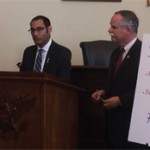In determining the ACR’s legislative priorities for 2012, the Government Affairs Committee reviewed multiple issues affecting the rheumatology community. One issue that continually stood out in these discussions was the challenge that excessive cost sharing for biologic drugs creates for patients seeking necessary treatment. Cost sharing is becoming more of a problem for patients with chronic conditions because some health insurance policies are moving vital medications, mostly biologics, into “specialty tiers” that utilize high patient cost sharing. This “fourth tier” commonly requires patients to pay a percentage of the actual cost of the drug—from 25% to 33% or more—which often places medically necessary treatments out of reach of many insured Americans.
The Government Affairs Committee decided to tackle the issue head on, and quickly developed legislative language that would limit commercial insurance plans’ cost-sharing requirements for medications in a specialty drug tier—typically Tier IV—to the dollar amount applicable to drugs in the nonpreferred-brand drug tier—Tier III. ACR staff and volunteers began meeting with and encouraging potential sponsors to champion this important issue. In March, Representatives David McKinley (R-WV) and Lois Capps (D-CA) introduced the bipartisan Patients’ Access to Treatments Act (H.R. 4209).
“The introduction of H.R. 4209 is a hugely significant first step in ensuring our patients have access to the medications they need to maintain their quality of life,” says Tim Laing, MD, chair of the ACR’s Government Affairs Committee. “Biologic drugs have provided breakthroughs in the treatment of many chronic, life-threatening, and disabling conditions. Rheumatologists can radically alter the trajectory of rheumatoid arthritis with the appropriate use of biologics, which can prevent joint destruction and disability, avert expensive joint replacement surgery, and provide our patients the opportunity to maintain daily functions. However, if the patients that need these medications cannot access them due to excessive cost-sharing requirements, we are costing our economy millions of dollars each year in additional healthcare costs and lost wages.”
The Patients’ Access to Treatments Act currently has 22 bipartisan cosponsors in the House of Representatives. The ACR has formed a coalition of physician and patient organizations whose constituencies are affected by specialty tier pricing.
The Coalition for Accessible Treatments currently includes the American Academy of Neurology, American Autoimmune Related Disease Association, American College of Rheumatology, Arthritis Foundation, Crohn’s and Colitis Foundation of America, Hemophilia Federation of America, Lupus Foundation of America, National MS Society, National Psoriasis Foundation, Patient Services Inc., and the Spondylitis Association of America. The Coalition is actively pursuing additional cosponsors in the House of Representatives and working to introduce companion legislation in the Senate.
Congressional Support for Rheumatology Starts with You
Congress is on summer recess August 4 through September 9. Remember that members of Congress are elected to represent you and it is your voice that influences them the most. Who better to educate Congress about the unique issues facing the rheumatology community than those who are on the front lines? Schedule a meeting in the district office with your lawmaker, send them an e-mail using the ACR’s Legislative Action Center, or simply place a phone call. However you decide to interact with your legislators over summer recess, know that you are making a difference for your profession and your patients.
The ACR’s government affairs staff is here to help you! Visit www.rheumatology.org/advocacy or call (404) 633-3777 for more tips and tools for communicating with Congress.
